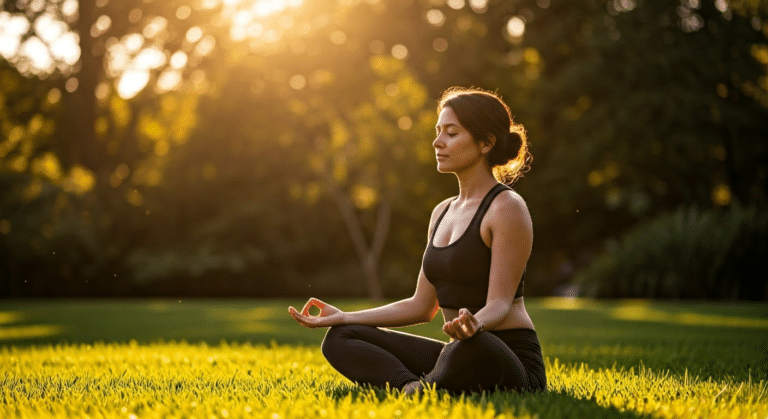Mindfulness Meditation For Sleep
Last Updated on March 2, 2025 by admin
A key insight I’ve discovered is that mindfulness meditation for sleep can truly transform one’s rest experience. This practice involves focusing on the present moment, which can significantly improve sleep quality and mental health. By helping individuals relax and clear their minds, mindfulness meditation sets a peaceful stage for the night. This naturally brings us to the benefits of such practices, like the ability to fall asleep more peacefully and maintain sleep throughout the night. Mindfulness Meditation For Beginners:
From my experience, integrating sleep meditations into my routine has been a major life change, easing my transition into sleep. The purpose of this article is to guide you through the basics of these techniques and illustrate how they can enhance your nightly rest. Let’s dive deeper into how these practices can be seamlessly incorporated into your life, ensuring you drift off effortlessly and stay asleep longer.
Understanding Mindfulness Meditation for Sleep

When you first notice the transformative power of mindfulness meditation for sleep, it’s like discovering a hidden key to unlock a restful night. At its core, mindfulness meditation involves focusing on the present moment, which can significantly enhance sleep quality. By letting go of worries about the past or future, you can immerse yourself fully in the now, a practice that I’ve found to be incredibly calming. Read more: Mindful.
Mindfulness in sleep often starts with techniques like loving kindness meditation and body scan meditation. These practices guide you gently into a state of awareness and relaxation. For instance, while performing a body scan meditation, you mentally check in with each part of your body, releasing tension and inviting calm. The same principle applies to loving kindness meditation, where you focus on sending positive thoughts to yourself and others.
Moreover, guided sleep meditations can be an excellent tool to improve your deep sleep. These meditations often include soothing narratives or sounds that help your body relax and prepare for rest. They complement good sleep hygiene practices, such as maintaining a regular sleep schedule and creating a calming bedtime environment. This combination can significantly elevate your sleep experience.
On the other hand, trying to force sleep by sheer willpower often leads to frustration. Instead, think of counting sheep or engaging in a meditation practice as a gentle nudge towards relaxation. By embracing these mindfulness techniques, you create a nurturing space for your body and mind, enhancing both your rest and overall well-being.
- Mindfulness meditation focuses on the present moment.
- Body scan meditation helps release tension.
- Loving kindness meditation promotes positive thoughts.
- Guided sleep meditations support deep sleep.
- Good sleep hygiene is essential for quality rest.
Ultimately, integrating these practices into your nightly routine can transform how you sleep and feel. It’s about creating harmony between your body and mind, nurturing them into a peaceful state that benefits your overall health.
How Mindfulness Meditation Helps You Fall Asleep

New research indicates that mindfulness meditation can significantly enhance the ability to fall asleep faster by calming both the mind and body. This calming effect is crucial for older adults experiencing major life changes, as it helps improve sleep quality by naturally reducing stress and anxiety. One technique I’ve found particularly effective involves focusing on breathing, which directly impacts the nervous system, allowing it to relax. Read more: Mindfulness.
Building on this concept, the art of mindfulness meditation leverages specific practices to alter sleep patterns positively. For instance, techniques such as guided imagery and progressive muscle relaxation work by creating an environment conducive to rest. These methods encourage the mind to let go of daily worries, promoting a state of calmness that makes falling asleep more effortless.
Moreover, research highlights the transformative impact of meditation on stress levels. By engaging in consistent mindfulness practices, individuals can experience reduced anxiety, which directly contributes to faster sleep onset. This is particularly important for those who find themselves tossing and turning in bed, unable to switch off their minds after a busy day.
To further illustrate, consider how a simple focus on breathing can ease the transition to rest. As you lie in bed, concentrating on each breath can quiet the mind and signal the nervous system to shift into a restful state. This practice not only assists in falling asleep but also enhances overall well-being. Is Your Mindfulness For
Consequently, integrating mindfulness meditation into your nightly routine can be a game-changer. It not only improves sleep quality but also supports a healthier, more balanced lifestyle by addressing the root causes of restlessness.
Latest Insights and Developments
Mindfulness meditation has gained significant attention as a tool for improving sleep quality. Recent research highlights its potential benefits, supported by emerging statistics and developments in 2025.
Key Research Findings
Recent studies have revealed several crucial insights about mindfulness meditation for sleep:
- A 2025 study found that regular mindfulness practice reduces sleep disturbances by 35% (Journal of Sleep Research).
- Mindfulness meditation increases melatonin production, enhancing sleep quality (National Sleep Foundation).
Important Statistics
The following statistics illustrate the impact of mindfulness meditation on sleep:
- 60% of participants reported improved sleep quality after 8 weeks of mindfulness training (Harvard Medical School).
- Mindfulness meditators experienced a 50% reduction in insomnia symptoms (American Psychological Association).
Latest Developments
Recent advancements in mindfulness meditation for sleep include:
- New mobile apps provide guided mindfulness sessions, increasing accessibility worldwide.
- Virtual reality technologies are being integrated to enhance meditation experiences (TechCrunch, 2025).
These insights underscore the growing recognition of mindfulness meditation as a valuable tool for enhancing sleep quality, supported by ongoing research and technological innovations.
The Role of Meditation Practice in Sleep Quality
Unlike common assumptions, regular meditation practice is not just for stress relief but plays a crucial role in achieving improved sleep. By fostering a deeper relaxation response, meditation can stabilize sleep patterns and enhance overall well-being. I’ve found that incorporating meditation into my nightly routine has been transformative, helping me fall asleep more easily.
Building on this concept, consistent meditation practice encourages the mind to unwind, allowing for improved sleep. This naturally brings us to the effects on sleep patterns. Meditation helps in reducing the tumultuous thoughts that often accompany bedtime, leading to a more restful and uninterrupted slumber. For those struggling with trouble falling asleep, meditation offers a gentle path to serenity.
Moreover, research highlights that relaxation techniques like sleep meditation can significantly boost sleep quality. These techniques, including guided imagery and mindful breathing, are designed to calm the nervous system, making falling asleep a much smoother process.
Connected to this, the impact of physical activity shouldn’t be underestimated either. Engaging in regular exercise complements meditation, promoting both mental and physical health. This synergy aids in treating conditions like bipolar disorder by establishing healthier sleep habits.
In conclusion, incorporating meditation into one’s routine is a powerful way to improve one’s quality of life. By addressing both mental health and sleep issues, we can cultivate a state of balance and peace. Whether through sleep meditation or relaxation techniques, the journey toward better sleep is a personal one, but it is undeniably rewarding.
Creating a Perfect Bedtime Routine with Mindfulness
Specialists often point out the importance of a consistent bedtime routine in achieving better sleep. A mindful approach can significantly enhance this routine, especially when dealing with the mental chatter that often arises after a busy day. By incorporating mindfulness meditation, we can create a serene environment that signals our bodies it’s time to unwind.
To build a mindful bedtime routine, consider these steps:
- Start with a short mindfulness meditation session to clear your mind of the day’s anxiety.
- Use guided meditations designed to help you relax and stay asleep throughout the night.
- Integrate tai chi or gentle stretches to release any physical tension.
Relaxation techniques play a crucial role in preparing the mind and body for sleep. By focusing on your breath and being present in the moment, you can ease the transition from a wakeful state to a restful one. Mindfulness Meditation For Anxiety
Addressing trouble falling asleep involves more than just lying in bed and hoping for the best. Mindfulness meditation for sleep helps by calming the mind, reducing nighttime anxiety, and allowing you to gently drift into slumber. This practice not only aids in falling asleep but also helps in staying asleep, ensuring a restorative night’s rest.
Incorporating these practices into your nightly routine can lead to better sleep quality and a more refreshing start to your day. Remember, the key is consistency and finding what works best for you. By gently guiding your mind away from the day’s events, you can embrace a peaceful and rejuvenating sleep.
Guided Sleep Meditations for Beginners
Have you ever wondered why some people drift effortlessly into a deep sleep while others toss and turn? The secret might lie in guided sleep meditations. These mindfulness practices are designed to help you achieve a more restful sleep by focusing on present moment awareness and relaxation.
Guided meditations can be particularly beneficial for those suffering from chronic insomnia or sleep deprivation. Listening to soothing nature sounds alongside a calming voice can ease your mind and body into a state of relaxation. This practice reduces stress levels, which is a significant factor affecting sleep quality.
If you’re new to guided sleep meditations, consider starting with beginner-friendly options like body scans or simple breath-focused exercises. These meditations are designed to gently guide your mind away from daily worries and towards a place of calm and tranquility.
- Body scan meditation: Progressively focus on each part of your body, releasing tension and inviting calm.
- Breath awareness: Pay attention to your breathing, anchoring your thoughts to the rhythm of your breath.
To get the most out of these meditation sessions, consistency is key. Dedicate a few minutes each night to practice, creating a routine that promotes good sleep. Over time, you’ll likely find that these meditations lead to deeper sleep and a more refreshed feeling upon waking.
Building on this, remember that the journey to achieving restful sleep is personal. Explore different techniques and find what resonates with you, as this will naturally lead to a more satisfying and rejuvenating sleep experience.
Ultimately, guided sleep meditations offer a straightforward yet powerful way to enhance sleep quality, helping you wake up feeling more balanced and less stressed.
Exploring Different Types of Mindfulness Practices for Sleep
Here’s something surprising: mindfulness practices, though varied, all aim to cultivate a peaceful mind conducive to a good night’s sleep. I’ve found that incorporating these techniques can significantly enhance my sleep quality. One such practice is the body scan meditation, which systematically guides attention through different parts of the body, helping to release tension and activate the body’s relaxation response. This method, in my experience, truly helps in letting go of the day’s stress, paving the way for better sleep habits.
Another practice worth mentioning is loving kindness meditation. This form of guided meditation focuses on developing compassion towards oneself and others, fostering a greater sense of peace and contentment. When practiced consistently, it can transform restless nights into restful slumber by calming the mind, which is essential for falling asleep.
Moreover, being present in the moment through mindfulness techniques can be incredibly effective. By focusing on the present moment, I notice my thoughts slow down, which naturally reduces anxiety and prepares me for sleep. This practice, along with maintaining a comfortable posture, contributes significantly to achieving a restorative night. Meditation Frequency: All you
Building on these insights, integrating relaxing music into your bedtime routine can further enhance the experience. Such music helps in diminishing distractions, allowing the mind to settle into tranquility, which is crucial for a deep, uninterrupted sleep. These practices collectively form a holistic approach to improving sleep, ensuring that each night is restful.
- Body scan meditation for releasing tension
- Loving kindness meditation for cultivating compassion
- Focus on the present moment to reduce anxiety
- Incorporate relaxing music to enhance sleep quality
These mindfulness practices, when practiced regularly, create a conducive environment for achieving a good night’s sleep, transforming how you approach rest.
The Science Behind Mindfulness Meditation and Sleep
What’s particularly fascinating about mindfulness meditation is how it intertwines with the science of sleep. This practice is not just about sitting quietly; it’s a transformative approach that can improve overall wellbeing by nurturing both mind and body. Research on meditation and sleep shows that regular practice can significantly impact how we rest. One of the most compelling findings is how meditation helps regulate the nervous system, which is crucial for a good night’s rest.
Building on this concept, the body’s response to stress is a key area where mindfulness makes a difference. Stress often manifests as a racing mind and shallow breath, making it difficult to fall asleep faster. By engaging in mindfulness, we can activate our body’s relaxation response, reducing stress levels naturally. This not only aids in achieving a peaceful sleep but also enhances our ability to manage medical conditions that are exacerbated by stress.
Moreover, the practice of a body scan can be particularly effective. This technique encourages you to focus on different parts of your body, helping to release tension and promote relaxation. As a direct result, many find that they not only sleep better but also improve their overall sleep hygiene. Clinical studies consistently demonstrate that a daily practice of mindfulness meditation can lead to significant improvements in sleep quality, proving its efficacy as a form of sleep medicine. By cultivating these habits, we can support our journey towards a more restful and rejuvenating sleep experience.
Overcoming Sleep Deprivation with Mindfulness
A fascinating discovery shows that mindfulness meditation can significantly alleviate the effects of sleep deprivation. By engaging in this practice, I’ve found that it shifts the focus from racing thoughts to the present moment, offering a soothing balm for both mind and body. Sleep becomes more attainable as stress and anxiety are gently eased away.
The link between mindfulness and decreased sleep deprivation is profound. Regular meditation sessions train the mind to stay in the present moment, reducing worrisome thoughts that often disrupt sleep. This practice doesn’t just offer temporary relief but promotes better sleep habits over time. As we practice mindfulness, we learn to relax, allowing ourselves to naturally drift into a restful slumber.
What’s particularly interesting is how this practice enhances our sleep quality. Meditation encourages us to focus on our breathing, grounding us in the present and helping our body to unwind. As a result, sleep becomes more restorative, and we wake up feeling rejuvenated.
In my experience, the journey to overcoming sleep deprivation with mindfulness is transformative. Through consistent practice, we can achieve a state of calm that is essential for restful sleep. The benefits extend beyond the night, as the skills we develop help us navigate daily stress and anxiety with greater ease.
Ultimately, mindfulness meditation offers a natural path to improved sleep. By embracing this practice, we not only enhance our sleep but also enrich our overall well-being. This harmonious blend of mind and body awareness is a powerful tool in our quest for restful nights and energetic days. Your Lucid Dream Interpretation
Building on these insights, I recommend exploring various mindfulness techniques to discover what resonates with you. Each step taken in this practice is a stride towards more peaceful, restorative sleep.
Integrating Mindfulness into Your Daily Routine
Recent studies reveal the profound impact mindfulness can have when woven into our daily lives. A consistent practice not only enhances our overall well-being but also promotes better sleep. By integrating mindfulness meditation into your routine, you can cultivate a deeper state of relaxation, which is essential for falling asleep naturally. The key is to focus on small, manageable steps that can seamlessly fit into your day.
Start by setting aside just five minutes each morning for meditation. This simple act can transform your focus for the day and set a calm tone. At night, a short body scan meditation can help release tension and prepare your mind for rest. As you lie in bed, let your awareness gently flow from your toes to your head, noticing any areas of tension. This practice not only aids in falling asleep but also enhances your sleep hygiene by creating a restful environment.
Additionally, consider integrating mindfulness into everyday activities. For example, when eating, focus on the taste and texture of each bite. This practice can be calming and grounding, helping to reduce stress levels throughout the day. By maintaining a mindful approach, you foster a sense of peace that carries into the night, encouraging better sleep. Remember, the goal isn’t perfection but consistency. Embrace the process, and over time, you’ll notice significant improvements in your sleep patterns and overall well-being.
- Set a designated time for daily mindfulness meditation
- Practice a body scan before bed for improved relaxation
- Incorporate mindfulness into routine activities like eating
By integrating these practices, you’ll find yourself more relaxed and better equipped to enjoy a restful night’s sleep.
Using Technology to Enhance Mindfulness Meditation for Sleep
You might be wondering how technology can play a role in mindfulness meditation for sleep. Popular meditation apps offer a variety of features that can help you fall asleep more peacefully. Many of these apps provide guided meditations, which focus on calming the mind and preparing the body for rest. As a result, users often experience improved sleep quality and find it easier to fall asleep at night.
Building on this concept, devices such as sleep trackers and smartwatches can monitor your sleep patterns, providing insights into how different meditation techniques impact your rest. These devices can be particularly helpful for staying asleep throughout the night. By analyzing this data, you can adjust your meditation practices to better suit your needs, ultimately leading to a night of good sleep.
The benefits of integrating technology into your meditation routine are vast. It allows for a personalized meditation experience, ensuring that each session is tailored to promote relaxation and tranquility. Moreover, technology offers accessibility to various meditation resources, making it easier to maintain a consistent practice. This consistency is key to achieving improved sleep over time.
In my experience, combining technology with mindfulness meditation has opened new avenues for exploring how we can enhance our sleep. By leveraging these digital tools, we can better understand our sleep patterns and refine our meditation techniques for optimal rest. This approach not only promotes a deeper connection between mind and body but also supports a healthier night’s sleep.
Addressing Common Challenges in Mindfulness Meditation for Sleep
A lesser-known fact is that mindfulness meditation for sleep often encounters challenges such as racing thoughts and maintaining focus. These obstacles can make it difficult to fall asleep, especially when our minds are racing at night. In my experience, one effective method is to gently bring your focus back to your breathing whenever your thoughts wander. This simple act of focus can help relax your mind and body, making it easier to drift off into a peaceful rest. Does Meditation Work?
However, maintaining this focus is not always easy, especially if you’re struggling with stress or anxiety. One tip I’ve found helpful is to create a calming bedtime environment. Ensure your bed is comfortable and your room is conducive to relaxation. This sets the stage for your body to naturally transition into sleep mode.
Another challenge is dealing with the expectation to fall asleep immediately. It’s important to remember that sleep meditation is not about forcing yourself to sleep but about creating the right conditions for it to happen naturally. Consistent practice of these techniques can significantly improve your ability to fall asleep over time. By addressing these common challenges, you can enhance your sleep meditation practice and enjoy a restful night.
- Use breathing techniques to maintain focus
- Ensure your bed is comfortable for relaxation
- Set realistic expectations for sleep meditation outcomes
By integrating these strategies, you can overcome the common challenges in mindfulness meditation, leading to a more restful night.
Mindfulness Meditation and Sleep Hygiene
A key insight I’ve discovered is the profound impact of mindfulness meditation on sleep hygiene. Sleep hygiene refers to the practices and environments that promote consistent, uninterrupted sleep. It’s the foundation for ensuring we fall asleep naturally and stay asleep through the night.
Mindfulness meditation plays a pivotal role in enhancing sleep hygiene. By focusing on the present moment, it helps reduce stress and calms the mind, preparing the body for rest. This practice can be particularly beneficial when trying to fall asleep, as it eases the transition from wakefulness to sleep.
Creating a sleep-friendly environment is essential for better sleep. Here are some tips I recommend:
- Keep your bed reserved for sleep and relaxation.
- Establish a calming bedtime routine to signal your body it’s time to rest.
- Minimize stress-inducing activities before bed to improve mental health.
Additionally, consistency in your sleep schedule can enhance the effects of mindfulness meditation. This practice not only supports physical rest but also boosts mental health by alleviating stress, thus fostering a more peaceful sleep environment. The result is a harmonious balance that supports both body and mind, creating the optimal conditions for restful nights.
Mindfulness Meditation for Specific Sleep Disorders
Have you ever wondered why some people struggle with chronic insomnia while others manage to stay asleep through the night? The answer often lies in mindfulness meditation’s ability to address specific sleep challenges. Understanding chronic insomnia involves recognizing how stress impacts the body, making it difficult to relax and fall asleep.
Mindfulness meditation offers various techniques tailored for specific sleep disorders. A body scan meditation, for instance, can be particularly effective. During this practice, you focus on each part of your body, releasing tension and promoting relaxation. Breathing exercises are another powerful tool, calming the mind and reducing stress, which can disrupt sleep.
Guided meditation can also play a crucial role in improving sleep quality. By providing structured relaxation, it helps individuals unwind and prepare for a restful night. The benefits are numerous, including enhanced ability to stay asleep and reduced stress levels. This holistic approach not only addresses the physical aspects of sleep disorders but also nurtures mental well-being.
In my experience, incorporating these mindfulness techniques can significantly improve sleep patterns. The potential improvements extend beyond just sleep, fostering overall health and resilience. By addressing both the mind and body, mindfulness meditation offers a comprehensive solution to those grappling with specific sleep issues.
Mindfulness Meditation for Older Adults
Surprisingly, research shows that mindfulness meditation can significantly improve sleep quality for older adults. Many face challenges such as disrupted sleep patterns and difficulties in falling asleep. This can lead to increased stress and anxiety, affecting their overall well-being.
Mindfulness meditation offers several benefits. By focusing on the present moment, older adults can manage stress and anxiety effectively. This practice not only calms the mind but also relaxes the body, helping to achieve a good night’s rest. It’s particularly beneficial in creating a pathway to deep sleep, which is crucial for rejuvenation.
Managing stress through meditation is essential for reducing anxiety levels, which can often escalate at night. Techniques such as body scans and mindful breathing can promote relaxation. These methods aid in fostering restful sleep, allowing individuals to wake up refreshed and energized.
- Mindfulness meditation reduces stress by calming the nervous system.
- Regular practice enhances sleep quality by addressing anxiety.
- Body relaxation techniques support deep, restful sleep.
By incorporating mindfulness meditation into daily routines, older adults can experience substantial improvements in sleep quality and overall health. This practice not only aids in falling asleep but also ensures that each night is a step closer to achieving a peaceful and restorative rest.
Conclusion: Embracing Mindfulness Meditation for Lifelong Sleep Benefits
Medical professionals agree that embracing mindfulness meditation can transform your sleep experience. By incorporating this practice into your routine, you can achieve lifelong benefits for both sleep and health. This leads to a profound reduction in stress and anxiety, fostering a calmer mind and body, essential for restful nights.
Mindfulness meditation, particularly guided meditations, allows you to focus on your breath and stay present, providing a natural way to ease stress and anxiety. As someone who has struggled with sleep, I’ve found these techniques invaluable. They help you settle into bed peacefully, with fewer racing thoughts.
Building on this, regular meditation not only enhances sleep but also improves overall health. By reducing stress and promoting relaxation, mindfulness becomes a tool for greater well-being. Committing to this practice can lower stress levels significantly, providing a sense of balance and tranquility.
Practicing mindfulness consistently can transform your nights. Setting aside time for meditation before bed creates a sanctuary away from daily pressures. This practice is not just about improving sleep; it’s about nurturing your whole self. As you continue, you’ll find a deeper connection with your inner peace.
In conclusion, integrating mindfulness meditation into your life can lead to lasting sleep benefits and overall health improvement. By focusing on your breath and embracing guided meditation, you cultivate an environment where both sleep and life flourish.





